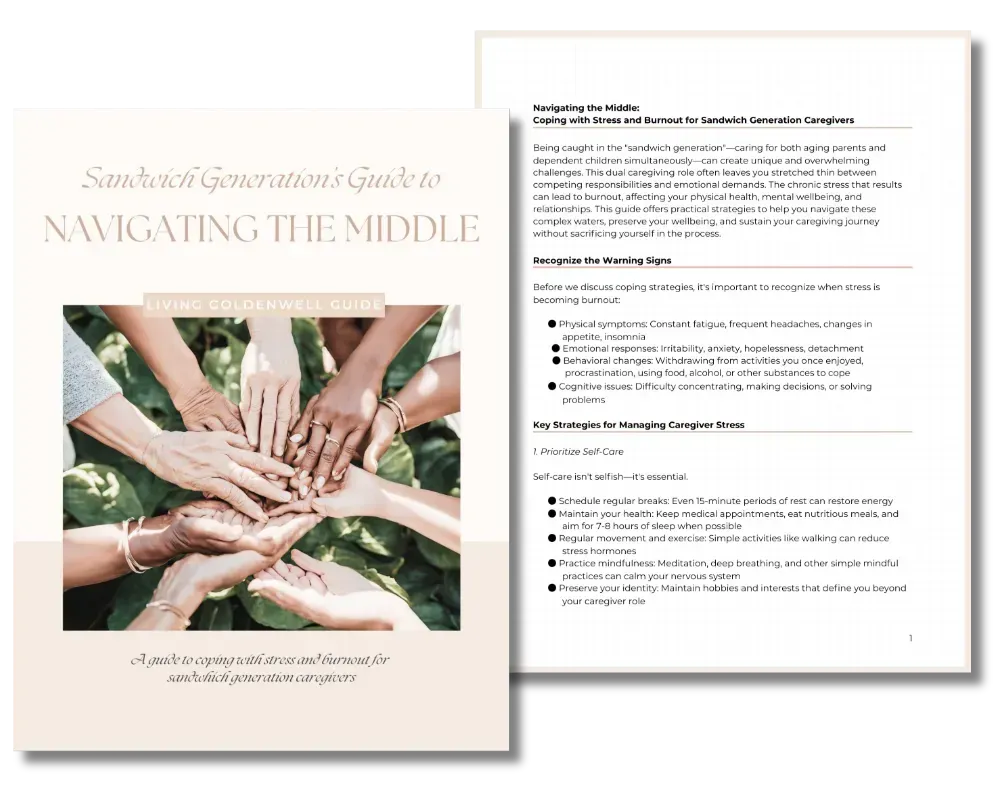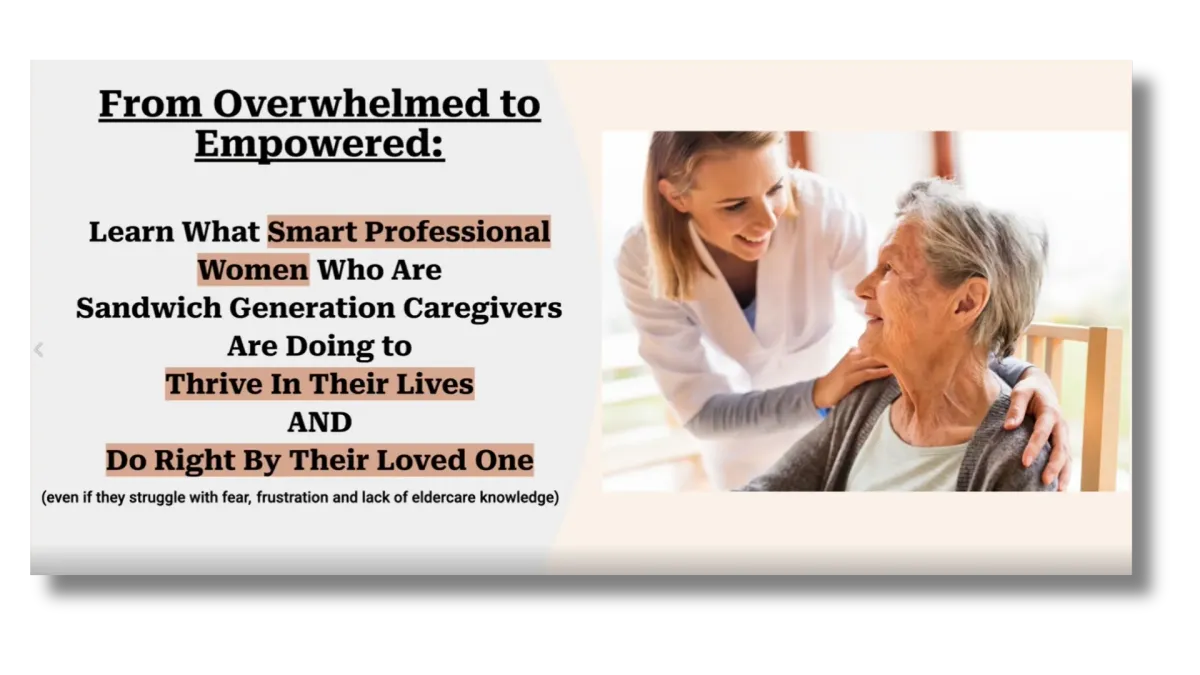
The Vital Role of Family Caregivers: Supporting Loved Ones & Strengthening Communities
The Unsung Heroes of Our Society: Family Caregivers
Family caregivers are the backbone of our society, providing essential support for loved ones while easing the strain on healthcare systems. Whether they are assisting an aging parent at home, coordinating care from a distance, or managing medical and financial responsibilities, sandwich generation caregivers play a critical role in ensuring their loved ones receive the best possible care.
For women in the sandwich generation, this responsibility is even more profound. Juggling careers, parenting responsibilities, and dealing with aging parents can be overwhelming, leading to sandwich generation stress and, in many cases, sandwich generation burnout. Yet, despite these challenges, caregivers continue to step up, offering love, compassion, and stability in times of need.

Key Takeaways:
Family caregivers are the backbone of support, easing healthcare burdens and improving loved ones' well-being.
Women in the sandwich generation face unique challenges, balancing caregiving, careers, and personal health.
Caregiver coaching helps reduce burnout, manage stress, and navigate the complexities of elder care.
Why Family Caregivers Matter More Than Ever
The role of family caregivers extends far beyond daily assistance. They are advocates, companions, and essential links between their loved ones and the medical community. Their work helps maintain the emotional well-being of aging family members, allowing them to stay in familiar environments rather than transitioning to institutionalized care before it’s necessary.
Many caregivers also take on roles that go unnoticed—managing medication schedules, handling insurance claims, and navigating the complex healthcare system. In cases where individuals are dealing with aging dementia parents, caregivers must develop even more specialized skills, balancing safety concerns with emotional support.
The Harsh Reality of Sandwich Generation Caregiving
Being a sandwich generation caregiver means you’re stretched thin—financially, emotionally, and mentally. You're juggling the care of your children while dealing with aging parents, and the toll it takes is staggering.
Financial Strain: The Hidden Cost of Caregiving
Caring for both children and aging parents isn’t just emotionally exhausting—it’s financially overwhelming. Many sandwich generation caregivers are caught between skyrocketing healthcare costs, lost income, and the ever-growing financial burden of caregiving. From delayed retirements to drained savings, the long-term financial impact is undeniable. Without proper caregiver coaching and financial planning, the strain can feel never-ending.
Crippling Financial Burden: Nearly 1 in 7 adults aged 40-60 financially supports both a parent and a child, often at the cost of their own retirement savings (Forbes, Henry Ford Health).
Skyrocketing Healthcare Costs: Medical bills for aging parents—especially those with dementia—can wipe out savings, forcing caregivers into debt or delayed retirement (Ideas for Leaders, One Medical).
Lost Income & Career Setbacks: Caregivers lose thousands annually from missed promotions, job exits, and reduced work hours, putting them at a lifelong financial disadvantage (Michigan Medicine, One Medical).
Emotional & Mental Exhaustion: The Unspoken Toll
The emotional weight of sandwich generation caregiving is heavy. Constantly tending to others while juggling work and personal life leads to chronic stress, burnout, and emotional fatigue. Women in the sandwich generation often feel isolated, guilty, and overwhelmed—especially when dealing with aging dementia parents. Without support, the cycle of sandwich generation burnout only worsens, impacting both mental and physical health.
Severe Burnout & Anxiety: 60% of sandwich generation caregivers report high stress, anxiety, and depression, struggling to meet the constant demands of caregiving (PubMed, One Medical).
Women Bear the Brunt: Women in the sandwich generation spend twice as much time caregiving as men, leading to higher exhaustion, isolation, and emotional distress (Michigan Medicine, Forbes).
Guilt & Isolation: Caregivers often feel trapped and alone, constantly torn between their children's needs and their parents' declining health (One Medical, Henry Ford Health).
Work-Life Balance: A Career on the Line
For many caregivers, maintaining a career while dealing with aging parents is a daily struggle. The demands of sandwich generation caregiving often mean missed promotions, reduced productivity, and even job loss. Juggling work, family, and caregiving responsibilities can leave little time for personal well-being. Without the right strategies, work-life balance collapses, making it harder to sustain both professional and personal commitments.
Declining Workplace Performance: Balancing caregiving and work leads to reduced productivity, stalled career growth, and missed opportunities (Ideas for Leaders, Michigan Medicine).
No Time for Self-Care: Between work and caregiving, there’s little time for rest, exercise, or a social life, leading to physical health deterioration (One Medical, Henry Ford Health).
Career Sacrifices: Many mid-career professionals are forced to scale back on leadership roles, affecting long-term career progression and financial stability (Ideas for Leaders, Forbes).
Caregiving is More Than a Responsibility—It’s a Heavy Burden
For sandwich generation caregivers, the weight of balancing work, family, and aging parents is relentless. The constant financial strain, career sacrifices, and emotional exhaustion take a toll—one that doesn’t just disappear with time. Women in the sandwich generation often bear the heaviest load, juggling the demands of children while dealing with aging parents or even aging dementia parents.
Without the right caregiver coaching and support systems, this cycle of sandwich generation burnout only worsens—leading to lost savings, declining mental health, and overwhelming stress.
Caregiver Coaching: Your Lifeline in Sandwich Generation
Caregiving If you're feeling overwhelmed by the sandwich generation stress, you're not alone. Balancing the needs of children, work, and dealing with aging parents—especially those with dementia—can feel impossible. The emotional, financial, and physical toll is real, and without the right support, sandwich generation burnout becomes inevitable.
That’s where caregiver coaching comes in. It’s not just about advice—it’s a personalized, strategic approach to help sandwich generation caregivers navigate the daily challenges of caregiving while protecting their well-being. A caregiver coach can help with:
Time & Energy Management – Practical strategies to juggle caregiving, career, and personal life without feeling pulled in a million directions.
Emotional Resilience & Stress Reduction – Proven techniques to manage anxiety, set boundaries, and avoid caregiver guilt.
Financial Planning & Resource Management – Guidance on budgeting, accessing assistance programs, and minimizing the sandwich generation financial burden.
Healthcare Advocacy – Expert insights on ensuring aging parents get the best care while avoiding common medical system pitfalls.
Preventing Burnout – Tailored self-care routines that fit into your busy schedule, helping you recharge without feeling guilty.
For women in the sandwich generation, who often carry the heaviest caregiving load, this kind of support isn’t just helpful—it’s essential. Investing in caregiver coaching means regaining control, making informed decisions, and creating a sustainable caregiving plan that doesn’t sacrifice your own health and happiness.
Because taking care of yourself isn’t selfish—it’s the key to being the best caregiver possible.
Recognizing the Value of Caregivers: The Unsung Heroes of Our Society
Caregivers do more than just help with daily tasks—they hold families together. Sandwich generation caregivers juggle careers, personal lives, and the demanding responsibility of dealing with aging parents, often with little recognition or support. Their unpaid labor saves the healthcare system billions, yet many face sandwich generation financial burdens, career setbacks, and emotional exhaustion.
It’s time to shift the narrative. Women in the sandwich generation and all family caregivers deserve more than just a pat on the back—they need real, tangible support. That means:
Government policies that offer tax breaks, paid leave, and financial aid to ease the weight of sandwich generation caregiving.
Workplace flexibility so caregivers don’t have to choose between their job and their loved ones.
Access to caregiver coaching, respite care, and mental health resources to prevent sandwich generation burnout and provide guidance on dealing with aging dementia parents.
The reality is this: Caregiving is essential work. When we invest in caregivers, we invest in stronger families, healthier aging, and a more compassionate society. It's time to give them the recognition—and the resources—they deserve.
Share Your Story: Your Experience Matters
No two caregiving journeys are the same, but sandwich generation caregivers share a common thread—the balancing act of supporting aging parents while raising a family or managing a career. Your story matters.
By sharing your experience, you not only give a voice to the challenges of sandwich generation caregiving, but you also offer hope and guidance to others navigating the same path. Whether you're dealing with aging dementia parents, managing sandwich generation financial burdens, or overcoming sandwich generation stress, your insights can be a lifeline for someone feeling overwhelmed and alone.
We’d love to hear your journey. Email us at [email protected] to share your experience or connect with a community that truly understands what you’re going through. Together, we can build a space of support, encouragement, and practical solutions for women in the sandwich generation and all family caregivers.
Final Thoughts: You Are Not Alone in This Journey
Balancing sandwich generation caregiving with work, family, and personal well-being is a demanding challenge—one that often comes with sandwich generation stress, emotional exhaustion, and even financial strain. But you don’t have to navigate it alone.
With the right support system, strategic planning, and caregiver coaching, you can find relief, set healthy boundaries, and regain control of your life. Whether you're struggling with sandwich generation burnout, dealing with aging parents, or feeling the weight of the sandwich generation financial burden, there are solutions designed to help you manage it all—without sacrificing your own well-being.
If you're ready to take the next step toward a more balanced caregiving journey, let’s explore the tools and resources that can support you.




